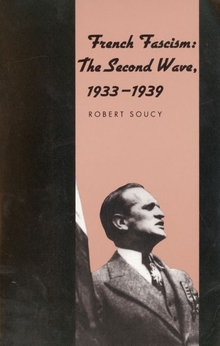French Fascism
WARNING
You are viewing an older version of the Yalebooks website. Please visit out new website with more updated information and a better user experience: https://www.yalebooks.com
The Second Wave, 1933-1939
Robert Soucy
Analyzing fascist "double-talk," Soucy underscores the social and economic conservatism of such mass movements as Francisme, the Solidarité Française, the Parti Populaire Français, and the Croix de Feu—as well as the ideological and membership crossovers between them. Examining police reports of the era, he penetrates beneath the "socialist" rhetoric of these movements and describes their financial backing from the steel and electricity industries and the middle- and lower-middle-class constituencies (rather than workers) who provided most of their recruits. Soucy investigates why thousands of French men and women found fascist ideas attractive during this period and what fueled the more authoritarian and brutal aspects of French fascism. According to Soucy, these tendencies (seen most recently in the right-wing activity of Jean-Marie Le Pen's National Front) periodically emerge from perceived threats from "alien" elements in French society—whether they be Communists, Socialists, immigrants, Jews, feminists, hedonists, democrats, or liberals "soft" on Marxism and secularism.
"This work attempts to capture the mass appeal of French fascism by examining its social bases rather than its summits, by studying the troops rather than the leaders, police reports rather than the discourses of intellectuals fascinated by Rome or by Nuremberg. . . . [The evidence that Soucy presents] is so extensive and overwhelming that the debate [over French fascism] should be reopened by the historians of our country, and without concession."—Nicholas Weill, Le Monde
"An informative and original book that helps us to see contemporary French history—and fascism—in a new, more balanced and lucid way."—John W. Hellman, McGill University
"Soucy has written a fine social history of fascism in France, which highlights the importance of financial backing from wealthy sympathizers and its widespread appeal in the eyes of petit-bourgeois party members. . . . Soucy's final chapter looks at the revolt against decadence on the part of French fascist intellectuals."—James F. McMillan, Times Literary Supplement
"In his stimulating work, Robert Soucy identifies and addresses key questions which lie at the heart of the continuing debate among historians and academics on the question of French fascism. . . . Soucy's studies throw fresh light on the troubled decade of the 1930s in France. . . . Will appeal to specialist and non-specialist alike."—David Drake, Financial Times
"Drawing largely on police files, Soucy has written a fine social history of fascism in France, which highlights the importance of financial backing from wealthy sympathizers and its widespread appeal in the eyes of petit-bourgeois party members."—James F. McMillan, Times Literary Supplement
"Undoubtedly the best single study of the French Right in the 1930s."—Nathanael Greene, History: Reviews of New Books
"This is an authoritative study by far the best work yet to appear on French fascism in the 1930s. . . . A major work [which] offers a challenging interpretation that all students of fascism and all students of the Third Republic will have to confront."—William D. Irvine, American Historical Review
"If French historiography has over the last 20 years, and with considerable prompting from foreign scholars, begun to redress the imbalances in the treatment of the occupation period, perhaps the time is now also ripe to reopen the debate on French fascism in the 1930s. Robert Soucy's book should be treated as a challenge which deserves a response."—Brian Jenkins, Modern & Contemporary France
"A powerful, solid book that will undoubtedly affect all discussions of Vichy. . . . There is no possible doubt that [Soucy] has firmly established his own scholarly place within its historiography."—H.R. Kedward, Journal of Modern History
"[This book] is an essential piece of research tipping the consensus toward the view that French fascism was indigenous, socially diverse and fairly widespread. . . . This book significantly extends our understanding of fascism beyond its manifestations in Italy or Germany to encompass a more complete picture of interwar European fascism that was multifaceted and internationally popular."—Samual Huston Goodfellow, Annals of the American Academy of Political and Social Science
Publication Date: January 31, 1997
15 b/w illus.








